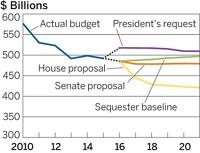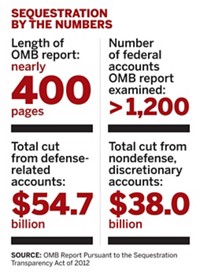Advertisement
Grab your lab coat. Let's get started
Welcome!
Welcome!
Create an account below to get 6 C&EN articles per month, receive newsletters and more - all free.
It seems this is your first time logging in online. Please enter the following information to continue.
As an ACS member you automatically get access to this site. All we need is few more details to create your reading experience.
Not you? Sign in with a different account.
Not you? Sign in with a different account.
ERROR 1
ERROR 1
ERROR 2
ERROR 2
ERROR 2
ERROR 2
ERROR 2
Password and Confirm password must match.
If you have an ACS member number, please enter it here so we can link this account to your membership. (optional)
ERROR 2
ACS values your privacy. By submitting your information, you are gaining access to C&EN and subscribing to our weekly newsletter. We use the information you provide to make your reading experience better, and we will never sell your data to third party members.
Policy
Looming Federal Budget Cuts
Deficit: Report warns of destructive impacts of sequestration, lacks specifics
by Andrea Widener , Susan R. Morrissey
September 18, 2012
All federal R&D programs can expect a cut of 8.2%—or 9.4% for defense-related research—on Jan. 2, 2013, if Congress and the White House can’t develop an alternative plan to reduce the federal budget deficit. That’s the message of a congressionally mandated report from the White House Office of Management & Budget (OMB) on the impact of the $109.3 billion in automatic, across-the-board budget cuts, known as sequestration.
“The report leaves no question that the sequestration would be deeply destructive to national security, domestic investments, and core government functions,” OMB writes in the report’s introduction. Sequestration, OMB adds, “is not the responsible way for our nation to achieve deficit reduction.”
The Obama Administration is drawing fire from Congress for missing its deadline by a week and for not providing enough specifics of sequestration’s impacts at the program, project, and activity levels. A law signed in early August set both the report’s deadline and its content.
“This report claims that more time is needed to provide these necessary details—but that is principally because the Administration has deliberately refused to plan for sequestration for an entire year,” say Sens. John McCain III (R-Az.), Lindsey Graham (R-S.C.), and Kelly A. Ayotte (R-N.H.) in a statement. “This disappointing report provides virtually no new information.”
Despite the lack of specificity, the impacts on science are clear. Sequestration “would have a terrible short- and long-term impact on the nation’s investments in scientific research and education, investments that are essential for long-term economic growth and prosperity,” says Hunter Rawlings, president of the Association of American Universities.
For example, at the Defense Department, which supports the largest share of federal R&D, nearly all of its research, development, test, and evaluation account will be subject to a 9.4% cut. In terms of dollars, OMB says, sequestration will take away $7.5 billion from the $79.5 billion budget of this account affected by sequestration.
At the National Science Foundation, OMB reports, the Research & Related Activities account will face reductions of 8.2%; however, a small amount of defense-related work will be cut at the 9.4% level. OMB calculates the total reduction to this account to be $469 million.
The National Institutes of Health will face a nearly across-the-board budget cut of 8.2%. In all, some $2.5 billion could be trimmed from the agency’s 2012 budget of $30.8 billion.
At the Department of Energy, OMB reports, the Office of Science will take a $400 million hit, with the vast majority of its $4.9 billion budget subject to an 8.2% cut. The budget of the National Nuclear Security Administration, which oversees the nation’s nuclear weapons complex, including work at the national labs, will be reduced at the 9.4% rate for defense-related programs. Should sequestration become a reality, OMB says, DOE can expect a total loss of around $1 billion from an eligible 2012 funding level of $11.0 billion.
The report “laid out in pretty bare terms what is at stake,” says Matt Hourihan, director of the R&D Budget & Policy Program at the American Association for the Advancement of Science. “But I’m not sure it really changes what we knew before, which is that we are up against massive cuts.”
Sequestration is the result of a law Congress passed in 2011 to rein in the federal deficit. The law set up a congressional supercommittee tasked with coming up with a plan to cut $1.2 trillion from the federal budget over the next decade. When that group failed, the deliberately blunt and indiscriminate sequestration provisions were put in place. If Congress and the White House don’t resolve federal spending issues and the full scope of sequestration kicks in, the federal budget will face cuts of $109.3 billion each fiscal year through 2021.





Join the conversation
Contact the reporter
Submit a Letter to the Editor for publication
Engage with us on Twitter